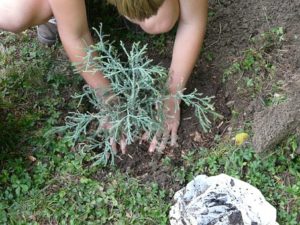This week’s guest post is from The Greenhouse People who share their top tips on getting green-fingered. There’s nothing better than growing your own organic fruit and veg, and it can be easier than you think. But how many of us have thought about applying for an allotment or even growing our own local fruit and veg full stop?
National Allotments Week 2018 takes place from 13th August, aiming to raise awareness about the nation’s allotments and the benefits of growing your own. What better time to start looking at top tips for allotment newbies and some of the ways you can speed up your fruit and veg success by using nature as your guide…
It’s all in the planning
With all the excitement that comes with getting your new plot, sometimes the planning stage can be cut short. Before digging, it’s vital to draw up a plan on paper, bearing in mind the type of soil you have, the way the sun hits your plot, the wind direction and access pathways.
 Equip yourself with good quality gardening tools (fork, spade, wheelbarrow, gloves and storage) and don’t be overwhelmed by the size of the task ahead. A wild allotment plot is a sign your ground is fertile…but best wait for a rain shower to dampen the soil before you start digging!
Equip yourself with good quality gardening tools (fork, spade, wheelbarrow, gloves and storage) and don’t be overwhelmed by the size of the task ahead. A wild allotment plot is a sign your ground is fertile…but best wait for a rain shower to dampen the soil before you start digging!
Top tip > Try to speak to more experienced allotmenteers who will know instantly what does and doesn’t work, saving you time and effort. You’ll also gain a green-fingered friend who can help you through your first year.
The power of perennials
These crafty plants are perfect for allotment beginners. Literally meaning “through the years”, perennial fruits and herbs – such as tomatoes, strawberries, garlic, basil and blueberries – typically live more than two years, returning each spring from their rootstock.
Top tip > Perennials’ hearty growth can deplete the nutrients in the soil so keep up its quality with compost or well-rotted manure before planting. Don’t be tempted to remove the dead foliage during winter – this will attract small insects and give back nutrients to the soil without you lifting a finger.
Friend or foe?
 ‘Companion planting’ is key to making the most out of your space and the quality of your produce. Certain complementary plants forge mutually beneficial relationships helping to repel pests, improve pollination and provide nutrients.
‘Companion planting’ is key to making the most out of your space and the quality of your produce. Certain complementary plants forge mutually beneficial relationships helping to repel pests, improve pollination and provide nutrients.
For example:
- Lettuces, radishes and other quick-growing plants sown between hills of melons or squash will mature and be harvested long before the vines need more room.
- Leafy greens such as spinach grow well in the shadow of corn.
Top tip > Growing members of the same ‘family’ close together increases competition for soil nutrients. Disperse onions, chives, leeks and garlic across your plot, instead of keeping them close together.
The Great British Weather
Sometimes the unpredictable British weather can let us down and the plant projects we’ve nurtured so tirelessly do not turn out to be successful.
However, adding a greenhouse means you can ignore and evade almost all seasonal changes and weather conditions throughout the year. Extreme temperatures, excessive rain or droughts will not cause any serious problems to greenhouse gardening efforts, giving your much-needed flexibility when it comes to any forms of complementary gardening.
Top tip > Adding an electric or gas heater, along with overhead lighting, can extend the growing period for warm season plants for even longer.
Herb heroes
Planting herbs throughout your plot can help to repel insects with their strongly scented leaves. For example, sage repels cabbage moths and French Marigolds are great to grow with tomatoes because their strong scents repel aphids. They’re also very pretty.
The benefits extend beyond protection, as the addition of herbs can enhance the flavours of other plants too. For example, growing basil alongside tomatoes and lettuce enhances the flavour of both.
Top tip > If you grow the herb wormwood you can make a tea that, when poured on plants, repels slugs.
Get involved!
Allotments can offer the perfect place to develop your passion for gardening. During National Allotments Week 2018 there will be open events across the country where you can find out more – check if your local area is hosting one here.
For more information on the Greenhouse People go to: https://www.greenhousepeople.co.uk/categories/greenhouses/








